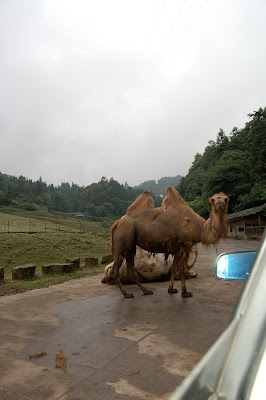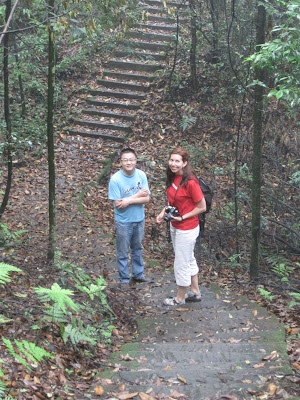Playing with Pandas
Reluctantly we left our new friend, Li Qiong, and the wonderful town of Lijiang to fly to Chengdu. Although the city of Chengdu is massive and sits in a pollution trap of a valley, we had just one destination in mind: The Ya’an Panda Reserve. We arrived around midnight, met our guide and driver, checked in to our hotel and crashed. After a quick breakfast, we checked out and drove two hours to the misty green mountainside reserve. As the car twisted up the mountain roads, I was looking out the side window and spotted some deer.
“A camel?” said Cath.
“They’re deer!” I said, shooting Cath a look of incredulity.
“No, in front of the car, there’s a camel,” she said. And, indeed, there was. Apparently there’s a depressing little zoo on the way to the panda reserve.
 |
| From camel |
Our driver, Luo Shifu, parked the car, and our guide, Deng Li, took us into the park. We wandered off the beaten path and wondered where we were going, but then Deng Li told us he knew some people who worked here so he was trying to get us access to the adult panda “dormitory” while the staff was at lunch. A worker eyed us suspiciously but then told us to be quiet and gestured for us to enter. We climbed a ladder to view the enclosures from above, and then we climbed down to look through the bars of each area’s gate. Most of the adult pandas sat next to their gates, reaching through the bars to pull in armloads of bamboo. Then they’d roll onto their backs and use their teeth to peel off the outer bark before munching on the tender stalks. Adult pandas can eat 20 kilos (44 pounds) of bamboo each day. So much for taking one home as a pet …
| From chengdu |
Soon it was our lunchtime. Deng Li had said that we would drive back down the mountain for lunch, which Cath and I thought was ludicrous, so we were relieved when he said, “The plan has changed.” We walked right across the street to a dingy guesthouse, where tables were set up outside. “Our driver wants to cook for you.” Stay tuned for details…
After lunch, we walked back across the street and took a tram to see the juvenile pandas. There were seven pandas in two enclosures. They’re not the most exciting animals in the world, but their mannerisms are so human that it’s easy to anthropomorphize. Cath and I laughed at how much they reminded us of one particular lazy student we had at SAS (who shall remain unnamed here!). The pandas gobbled up vitamin cakes brought by a caretaker and then rambled about, lay down, got up, sat for awhile, lay down again, rolled over, and more of the same.
| From chengdu |
We kept hearing a woman yelling, “Qing Qing!” (pronounced like Ching Ching), and we assumed it was a silly tourist trying to get the panda’s attention. Annoyed, we walked toward that enclosure, where we realized the woman was a caretaker trying to rouse lazy Qing Qing, who was napping under a tree up the hill and refused to come down to eat his vitamin cake. We dashed up the hill to get a better view of him, and we cracked up at his obvious attempts to ignore the shouting. He would roll over and put his paws over his ears. Then he would kick his foot out and stretch a bit. Finally, the caretaker hauled a bucket of bamboo shoots up the hill and tossed them at Qing Qing. Without standing up, he reached out, felt around for a bamboo shoot, and then popped it in his mouth. The caretaker threw them a little further away, so reluctantly Qing Qing roused himself from his beloved slumber, rolled up to all fours, sought out the bamboo shoots and then lumbered down the hill to get his vitamin cake. Cath totally related to Qing Qing’s love of sleep, so that became my new nickname for her on this vacation, especially each morning when I woke her up.
| From Qing Qing |
Deng Li said we could walk to see the baby pandas, but it turned out he didn’t really know the way. We found a trail with a sign pointing to the “Panda Kindergarten,” so we set off through the drizzly mist. The trail took us up and down rocky steps slick with wet leaves. The steep mountainous forest was thick with bamboo and ferns, and Deng Li pointed out that this was the real habitat of wild pandas. Considering that there are only about 1,600 giant pandas left in the wild, it was no surprise that we didn’t see any.
 |
| From Bamboo Forest |
We arrived at the Panda Kindergarten at feeding time. About 10 babies scampered around the large enclosure while caretakers brought out bowls of food and a big tray of apples and carrots. The babies were all around six months old, and they looked like puppies eating out of their bowls. Several rolled on their backs to munch on the carrots. A few refused to come down from the elevated platform, so the caretakers had to climb up to deliver the food. After a couple minutes, most of them flopped down on their bellies for a nap.
Cath and I knew of several people who made donations to the reserve in exchange for a photo with a panda, and we decided it was a worthy cause and a once-in-a-lifetime experience. We expected to sit in a chair and have a caretaker position a panda next to us, but the workers said we could enter the enclosure to play with the babies! We couldn’t believe it. After waiting an hour for naptime to finish, we suited up in a surgical gown, booties and gloves. Unfortunately, the rain really started to fall at that point, and Deng Li was not the most talented photographer. But we got a few good shots and some unbeatable memories.
| From Suited Up |
At first, the head caretaker/researcher told us we had to stay on the ground, which was disappointing because the pandas were all up on the platform. We reached up and scratched their tummies. Finally, he said, “OK, you can climb up there but you’re going to get very dirty.” As if we cared! We scrambled up and the pandas loped over to greet us. One grabbed my hand with his thick padded paw, nuzzled my ear and then plopped on my lap, clamping his mouth gently onto my arm. He unlatched only when Cath offered him an apple that had been tossed up by a caretaker. I was surprised at how heavy he was and how coarse his fur felt. Much too quickly, the caretaker told us it was time to go.
If this slideshow doesn’t work, just refresh your page! And click on the little speech bubble after the slideshow starts to see the captions:
Later Cath and I reflected on our day with the pandas. We felt good about making a large donation to the panda reserve, but we worried that the encounters between tourists and pandas would diminish the efforts to rebuild the wild population. So far, China has been largely unsuccessful in releasing pandas into the bamboo forest. The pandas born in captivity are too coddled by the caretakers and cooing tourists and have no survival skills, researchers agree. That said, we selfishly admitted how fortunate we felt to see and interact with these rare and unique animals up close.
